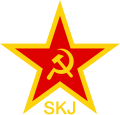Name Took office Left office Tenure Birth PM Death Office Nationality Gender Ref. Momir Bulatović 28 April 1989 4 February 1990 282 days 1956 ? 2019 President of the League of Communists of Montenegro Central Committee Montenegrin Male Nijaz Duraković 29 June 1989 27 December 1992 1 year, 181 days 1949 1967 2012 President of the League of Communists of Bosnia and Herzegovina Central Committee Muslim Male [ 21] Petar Gošev 1989 20 April 1990 1 year, 109 days 1948 1971 Alive President of the League of Communists of Macedonia Central Committee Macedonian Male Kaqusha Jashari May 1988 17 November 1988 200 days 1946 1975 2025 President of the League of Communists of Kosovo Central Committee Albanian Female Georgije Jovičić 28 June 1986 1988 1 year, 187 days 1927 1942 2011 President of the Organisation of the League of Communists in the Yugoslav People's Army Montenegrin Male Remzi Kolgeci 17 November 1988 27 January 1989 71 days 1947 ? 2011 President of the League of Communists of Kosovo Central Committee Albanian Male Boško Kovačević 14 November 1988 20 January 1989 67 days 1946 ? 2023 President of the League of Communists of Vojvodina Central Committee Serb Male ? Milan Kučan 28 June 1986 December 1989 3 years, 156 days 1941 1958 Alive President of the League of Communists of Slovenia Central Committee Slovene Male Jakov Lazaroski 28 June 1986 December 1989 2 years, 187 days 1936 1958 2021 President of the League of Communists of Macedonia Central Committee Macedonian Male [ 27] Slobodan Milošević 28 June 1986 24 May 1989 2 years, 330 days 1941 1959 2006 President of the League of Communists of Serbia Central Committee Serb Male [ 28] Rrahman Morina 27 January 1989 16 July 1990 1 year, 170 days 1943 1969 1990 President of the League of Communists of Kosovo Central Committee Albanian Male [ 29] Abdulah Mutapčić May 1988 29 June 1989 1 year, 59 days 1932 1960 2013 President of the League of Communists of Bosnia and Herzegovina Central Committee Muslim Male Milica Pejanović 26 April 1989 28 April 1989 2 days 1959 ? Alive President of the League of Communists of Montenegro Central Committee Montenegrin Female Ivica Račan 28 June 1986 20 January 1990 50 days 1944 1959 2007 President of the League of Communists of Croatia Central Committee Croat Male Miljan Radović 28 June 1986 11 January 1989 2 years, 197 days 1933 1951 2015 President of the League of Communists of Montenegro Central Committee Montenegrin Male Ciril Ribičič December 1989 20 January 1990 52 days 1947 ? Alive President of the League of Communists of Slovenia Central Committee Slovene Male Milovan Šogorov 6 October 1988 14 November 1988 39 days 1941 1960 2020 President of the League of Communists of Vojvodina Central Committee Serb Male [ 34] Petar Šimić 1988 20 January 1990 2 years, 19 days 1932 1948 1990 President of the Organisation of the League of Communists in the Yugoslav People's Army Croat Male [ 35] Nedeljko Šipovac 20 January 1989 20 January 1990 1 year, 177 days 1942 1960 2025 President of the League of Communists of Vojvodina Central Committee Serb Male [ 36] Stanko Stojčević 28 June 1986 December 1989 3 years, 156 days 1929 1944 2009 President of the League of Communists of Croatia Central Committee Croat Male Đorđe Stojšić 28 June 1986 6 October 1988 3 years, 206 days 1928 1945 2014 President of the League of Communists of Vojvodina Central Committee Serb Male Bogdan Trifunović 24 May 1989 16 July 1990 1 year, 53 days 1933 1950 2007 President of the League of Communists of Serbia Central Committee Serb Male [ 39] Milan Uzelac 28 June 1986 May 1988 1 year, 308 days 1932 1949 2005 President of the League of Communists of Bosnia and Herzegovina Central Committee Muslim Male Azem Vllasi 28 June 1986 May 1988 1 year, 308 days 1948 1965 Alive President of the League of Communists of Kosovo Central Committee Albanian Male 

